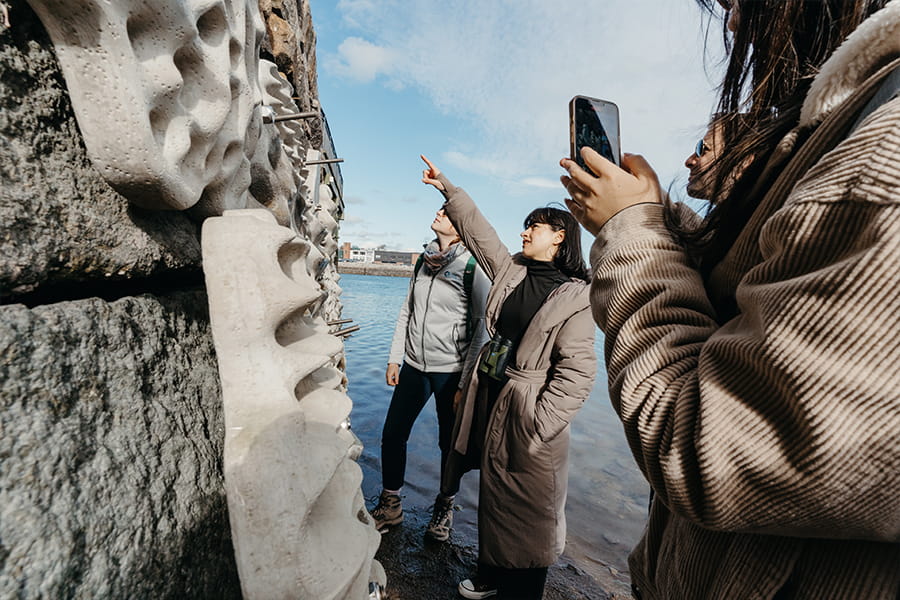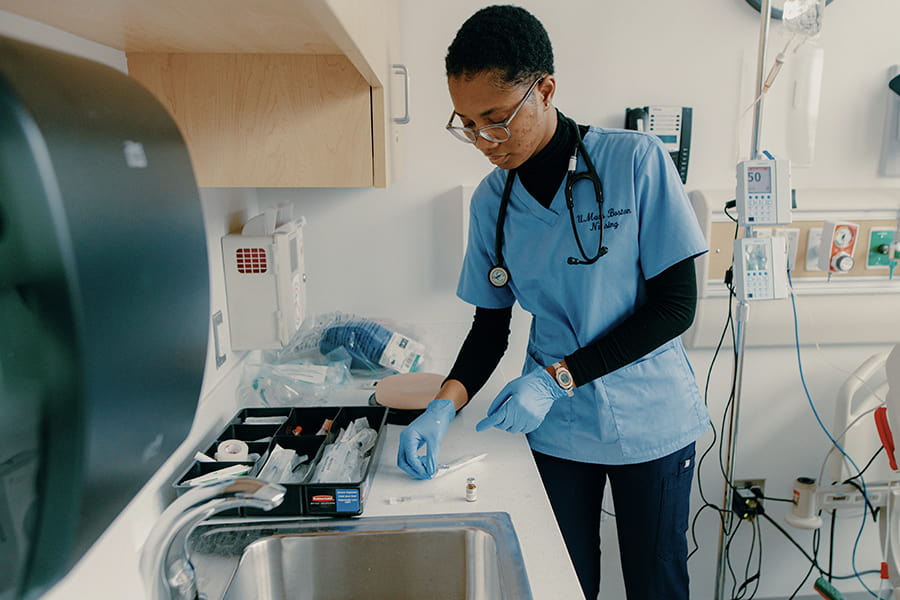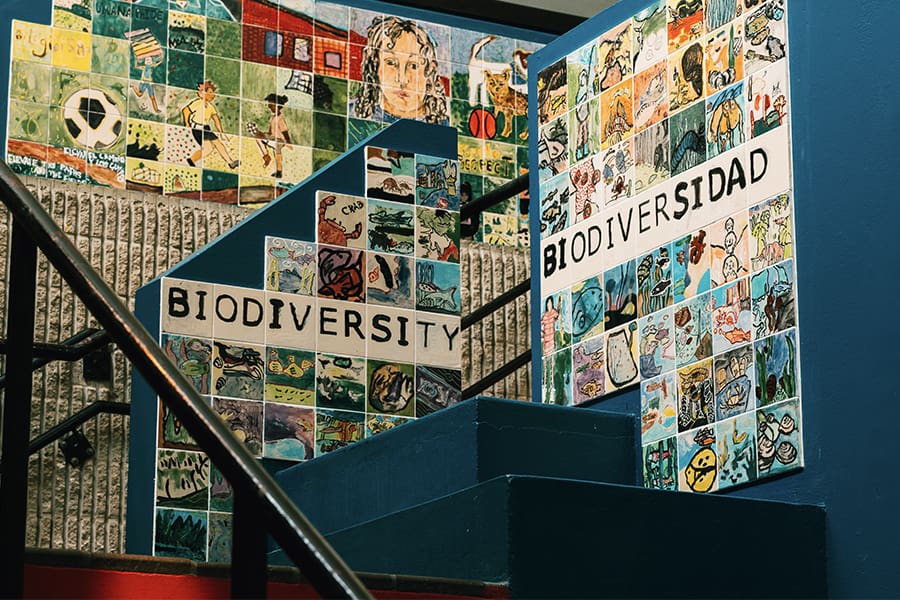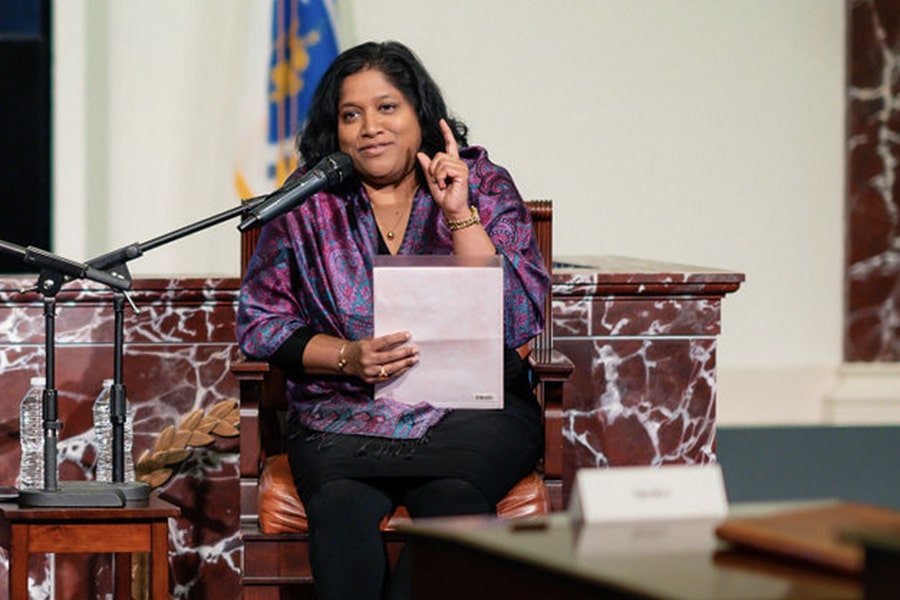Interdisciplinary Research & Scholarship
The Grand Scholarly Challenges address complex, real-world issues that require a wide range of expertise to have a tangible impact on local, national, and global scales. As the only public research university in Boston, our community is committed to working together to collaboratively shape evidence-based solutions that benefit the greater good.
Our Four Grand Scholarly Challenges:

Climate Equity & Urban Coastal Areas
Climate change is the existential threat of our times. In our harbor city, it is a clear, urgent environmental challenge that touches upon health and wellness, our economic future, and the very livelihood affecting every individual, family, and community in Boston and beyond.

Bridging Divides – Cells to Societies
Societal changes are bringing into focus existing and emerging acute and chronic health challenges fueled by intersecting inequities. Addressing health inequities requires bridging disciplinary divides in understanding the root causes of disease, increasing access to health care, improving mental and physical health outcomes, and addressing health care policy.

Education for the Future
Reinventing education that fosters inclusive excellence requires strategic, creative inquiry that enables educational structures to support alignment with the histories, experiences, values, and aspirations of students who are not the same as those for whom historical educational systems were designed.

Advancing a Just Society
Our local community, indeed our economy and society, must address systemic inequities and anti-democratic trends such as the rise of authoritarianism in the United States and beyond, and assaults on truth. These trends, exacerbated by growing inequality and social media, contribute to polarization and the erosion of democratic norms, which limit our ability to address persistent inequities.
Engage & Collaborate
Share Ideas at Free Lunch “Fridays”
Explore and share new ideas. Any three scholars on campus can propose a ninety (90)-minute session on a topic of their choice. We will support logistics including advertising the event and providing lunch. Note: It doesn’t have to be on a Friday!
Propose a LunchAttend Grand Scholarly Challenges Office Hours
Discuss an idea, develop a proposal, brainstorm a concept, or just chat about scholarly impact with Bob Chen, Director of Grand Scholarly Initiatives.
Email Bob ChenWorkshop Ideas at a Grand Scholarly Challenges Convening
Participate in a campus-wide convening, a two-hour workshop designed to help attendees generate new ideas and make connections across campus.
Additional dates to be announced.
Past convenings:
May 2025: Climate Equity and Urban Coastal Areas
April 2025: Advancing a Just Society
February 2025: Education for the Future
GSC Request for Proposals
About the 2025 GSC RFP
The Office of the Provost is pleased to continue a funding opportunity to support UMass Boston faculty and staff engagement in research and curricular initiatives that address the Grand Scholarly Challenges (GSC) of our Strategic Plan.
The four GSCs are:
- Climate Equity and Urban Coastal Areas
- Bridging Divides in Health Equity – Cells to Societies
- Education for the Future
- Advancing a Just Society – Local and Global Dimensions
We invite proposals that feature cross-disciplinary collaboration within a college or across colleges and/or Institutes. Proposals could be either anchored in one GSC or span across two or more GSCs. These inter- and transdisciplinary proposals may be primarily research-focused or articulate curricular innovations; they may engage faculty and staff collaboration as well as include graduate and undergraduate students.
We will prioritize proposals that lay the groundwork for new collaborations or strengthen nascent collaborations that would benefit from the catalyzing funds provided by this opportunity.
A strong proposal is one that explains its potential impact. Examples include: (1) research that could translate into a policy position; (2) deep community engagement leading to documentable outcomes; (3) training a diverse, skilled workforce; (4) curricular innovation that positions graduate and undergraduate students as strong competitors for positions across various sectors of the workforce of the city/state; (5) publications in venues that reach a significant audience; (6) potential to lead to future external funding.
For 2025-26, we will invite RFPs for two types of proposals:
Type 1: Up to $15,000 for catalytic research or curricular activities spanning up to two calendar years.
Type 2: Up to $5000 for proposal preparation support with an expectation of an external proposal submission within 18 months of the award.
Due Date: November 1, 2025
How to Submit: Send as PDF attachment to bob.chen@umb.edu
Subject Line: GSC Proposal 2025
Awards Announced: Expected January 2026
Preparing a Proposal
Proposals should include the following details:
- Title
- Principle Investigator and co-PIs
- A clear statement of the Type for which you are applying
- Statement of impact/need and outcomes (<500 words)
- Description of research and/or curricular project (<1000 words) excluding references) and indication of the GSC(s) being addressed
- Budget narrative (up to 500 words)
- Detailed Budget
- Biosketches (two-page abbreviated CVs) of each member of the team
- List of other funding sources for the project (current or potential)
Examples of allowable costs include:
Costs to pay for time of external community partners to emphasize our commitment to community engagement and equity; compensation for time of UMass Boston staff or Center/Institute researcher; student stipends; typical research expenditures such as gift cards for survey or interview participants, transportation costs for field visits, travel to conferences with sustainable outcomes, research supplies that are not capital equipment.
Examples of non-allowable costs include:
Stipends to non-UMass Boston faculty and external academic institutions, purchasing equipment, Add-Comp for tenure and tenure track faculty.
Who is eligible to apply:
Tenure Track and continuing appointment NTT faculty; staff researchers of Centers and Institutes.
Frequently Asked Questions (FAQ)
Can we provide more concrete examples for bench/basic scientists and ways they can fall under the GSCs, particularly for those who do not directly see their research as applying?
Fundamental research with direct or indirect implications for one or more of the GSCs are encouraged.
Can a PI be on more than one proposal? Lead or collaborator?
Yes, as lead and/or collaborator. Multiple submissions are allowed, but an individual is not likely to receive support for more than one award.
Can a PI apply for funding multiple years in a row?
Yes.
Are extended projects allowed?
These funds are designed to be catalytic. However, start and end dates can be planned appropriately.
What are the budget requirements?
If awarded, a detailed budget and budget justification will be required to set up the award. Details at this stage may be discussed with the Program Manager (Bob Chen).
What will be the reporting requirements?
6 month update (<200 words), 12 month (<500 words), 24 month (Final Report)
Are there other GSC opportunities?
Yes! More information will be forthcoming regarding Free Lunch Fridays (3 researchers planning a 90 min session on anything related to the GSCs), Bob’s Office Hours, and GSC workshops.
What is the evaluation rubric?
40% - Likelihood that the GSC funds will be catalytic and will result in amplified impact over time.
20% - Clearly articulated need(s) and project activities and outcomes address the stated need.
20% - Budget is well-aligned with project plan.
20% - Strength of alignment/integration of the project and personnel with one or more of the GSCs.
Grand Scholarly Challenge Awardees
2024 GSC Awardees
The request for Grand Scholarly Challenge proposals issued in November 2024 catalyzed a great deal of scholarly activity, generated strong fundable ideas, and initiated new collaborations. Overall, twenty-nine proposals were submitted.
Congratulations to the six awardees:
- Flood-Induced Managed Retreat Among Older Adults in Subsidized Housing in Massachusetts
Award: $35,000
Researchers: Sowmya Balachandran (PI, School for the Environment), Sung S. Park (Gerontology), Kristin Uiterwyk (Urban Harbors Institute) - Socioeconomic Background & Early Career Opportunities
Award: $15,000
Researcher: Michelle Jiang (PI, Economics) - Think Higher at UMass Boston: Counselor Education for Inclusive Higher Education Excellence
Award: $15,000
Researchers: Clare Papay (PI, Institute for Community Inclusion), Chelsea VanHorn Stinnett (Institute for Community Inclusion), Tim Poynton (Counseling and School Psychology) - Strengthening Indigenous Resilience: A Community-Led Approach to Climate Adaptation for the Lumbee Tribe of North Carolina
Award: $15,000
Researchers: Bala Balachandran (PI, Sustainable Solutions Lab), Cedric Woods (Institute for New England Native American Studies), Wendy Moore (Lumbee Tribe of North Carolina) - Mapping and Building Informal Networks of Care: A CBPR Project to Address Mental Health Disparities among Black Bostonians
Award: $10,000
Researchers: Tahirah Abdullah (PI, Psychology), Nedra Lee (Anthropology), and Evan Auguste (Psychology) - Evaluating the Ability of Nature-Based Solutions to Improve Stormwater Quality with Regards to Plastic Pollution and Develop Education for Effective Green Infrastructure Management
Award: $10,000 Researchers: Shannon Hogan (PI, Urban Harbors Institute),
Juanita Urban-Rich (School for the Environment), Carol Ann Sharicz (Curriculum and Instruction), and Sean McCanty (Neponset River Watershed Association)

UMass Boston Research Resources
Many of the complex challenges of the day—including the GSCs profiled above—will not and cannot be effectively tackled by any one discipline. They require the merging of ideas, approaches, and technologies from widely diverse fields of knowledge—to prompt innovation. UMass Boston is dedicated to becoming a leader in interdisciplinary research and supporting our researchers as they work together on solutions.
